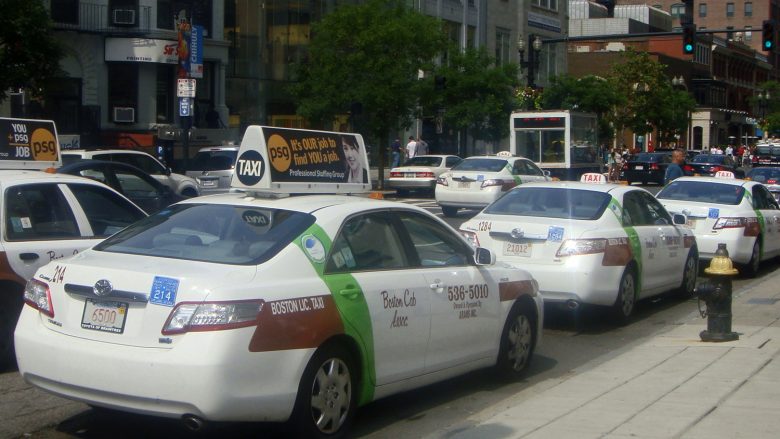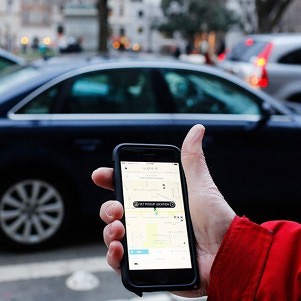Uber bill would commit tax money to taxi firms, study says
By NBP Staff | April 21, 2016, 14:58 EDT
 Taxis line up waiting for fares in Boston. (Photo courtesy of Wikimedia.org)
Taxis line up waiting for fares in Boston. (Photo courtesy of Wikimedia.org) BOSTON – Using taxpayer money to prop up taxi companies shouldn’t be included in legislation to regulate ride-sharing services in Massachusetts, a Pioneer Institute study recommends, pointing out that other provisions in a pending bill could also put a publicly financed fund on the hook to cover taxi company losses.
The nonprofit policy research organization in Boston also faults other parts of the bill, which would establish rules to govern ride-share services like Uber as well as mandate fees they would be required to pay before they could continue operating in Massachusetts. A version of the measure, H 4049, passed the House of Representatives last month and the Senate is developing its own version.
The bill calls for the Massachusetts Growth Capital Corp., formed by the state in 2010 and funded initially at $35 million, to commit at least 10 percent of its capital to help taxi companies become more competitive with services like Uber and Lyft. The researchers point out that the ride-sharing services wouldn’t be eligible for assistance from the agency, whose mission is to help small, women- and minority-owned firms get established and to promote development in underserved, low- and moderate-income areas, particularly in “gateway cities.”
Among other assistance, the House bill would authorize loan guarantees from the agency to back purchases of taxi medallions, which have fluctuated drastically over the years, according to Pioneer. It says medallions sold for $100,000 each in 2001 and rose to as much as $700,000 in early 2014 before falling to $350,000 in August of that year. A medallion is required to operate a vehicle as a taxi in Boston.
Under a loan guarantee, if the purchase of a medallion is made with borrowed funds, the interest rate would likely be reduced and if the recipient failed to pay back the money, or defaulted, the agency would be on the hook to cover the debt. The study notes that the entry of Uber, Lyft and other non-licensed car-for-hire services in the Boston market sharply undercut the value of a medallion by introducing new competitors for fares. And they have put financial pressure on cab companies.
With taxpayer backed loan guarantees, which could also be applied to vehicle financing, the public would shoulder much of the risk of a taxi company failing, the authors say. The measure would also have the agency provide financial help for taxi companies trying to modernize to better compete with ride-share services.
Pioneer’s researchers also took aim at provisions in the House bill that would exclude ride-share services from picking up fares at either Logan International Airport or the Boston Convention & Exhibition Center until 2021. The exclusion “creates a protectionist barrier that provides an unfair advantage to incumbent industry providers and disregards consumers’ preferences,” study authors Matthew Blackbourne and Brendon Murphy say in the report.
“The provision restricts consumer choice and limits competition in the interest of protecting cab companies,” said Jim Stergios, Pioneer’s executive director, in a statement accompanying the report’s release Thursday.
Executives of the convention center also objected to the exclusion on Wednesday, according to a State House News Service report. It said the main author of the House measure, Rep. Aaron Michlewitz, a North End Democrat and chairman of the House Financial Services Committee, defended the provision by noting that some of the money used to build the convention hall came from the sale of 260 medallions in 1997, calling it “an attempt to create balance.”
Massachusetts Gov. Charlie Baker, a Republican who once led Pioneer, has proposed a measure to regulate ride-share services, but the State House News service said it doesn’t include the exclusions at Logan and the convention center.
The News Service said ride-share services handled 15,000 fares either to or from the convention center in 2015, while taxis served 130,000.
“There is simply not enough supply to meet the transportation demands of our customers who choose to come to Boston from around the world and our business will suffer by taking any options off the table,” Nate Little, a convention center spokesman, said in a statement, the News Service reported. Banning ride-sharing services would put Boston at a disadvantage in attracting new business, the hall operator told the News Service, which would be bad for all concerned.
“More business at the BCEC means more opportunities for the entire local transportation industry to participate and grow. That is a goal we are sure is shared by everyone,” Little said.
The Massachusetts Fiscal Alliance also joined the fight over the provision Wednesday, writing a letter to Sen. Jamie Eldridge (D-Acton), who is leading the Senate’s effort to write its own bill on the matter. In the letter, Paul Craney, the alliance’s executive director, calls the protection zones a “bad idea.”
“Both areas suffer form inadequate transportation options,” Craney wrote. “Visitors to Boston, especially those traveling for business, are a great source of economic activity.”
Eldridge indicated he may remove the exclusion, citing the need to encourage innovative industries in the state, the News Service reported. It said Uber has objected to parts of the bill while representatives of the taxi industry have been supportive.











